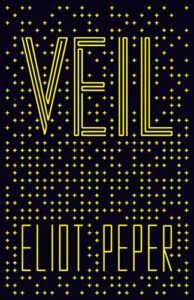Eliot Peper is near the top of my current list of favorite authors. I’ve read most of his books, including the Uncommon Stock Series, Cumulus, and Bandwidth. I really like the way he weaves together mystery and suspense using present day technologies as a backdrop. So it was with high expectations that I read his latest work, Veil.
Veil’s primary character is a young adult, Zia León. She is part of a group of high achieving individuals who attended a private European boarding school. All of those in her group have excelled and taken on jobs that have an impact on the international stage. Zia’s current role is leading humanitarian aid missions to regions ravaged by drought, wildfires, and sea level rise. Her real passion, however, is understanding her mother’s work around the effects of climate change and the circumstances surrounding her death during an oppressive heat wave on a research trip to South America. Because of her role and lineage, she becomes the target of an international kidnapping ring, which leads her to a reunion with her estranged father. The intrigue only builds from there when Zia learns of her father’s role in altering the Earth’s climate.
As with other Peper novels, he does a great job using present day technologies and challenges as the backdrop for a thrilling story. While I found the story and writing to be on the level I would expect from a Peper novel, Veil isn’t one of my favorites of his. There’s more emphasis on character development than I would like which slows down the pace of the book. Basically, it was more about the people than the action. Then again, my critique could be the result of approaching the book with such high expectations, which may have been unrealistic and influenced my view of the book.
That said, Peper wrote an outstanding afterword to Veil. I wouldn’t normally recommend you read the author’s afterword which tends to read like an Academy Award speech laced with thanks you’s and acknowledgements. However, in this case I was impressed by his passion around the topic of climate change and his motivation to write the book.
If you’re thinking about exploring the works of Eliot Peper, I wouldn’t put Veil at the top of your list, but I wouldn’t leave it off your list either. I’d suggest starting with one of the books mentioned above, such as Uncommon Stock or Cumulus, and then working your way down to Veil. It’s classic Eliot Peper, and while it may not have moved as fast as I would have liked, I doubt that you will be disappointed in it.

